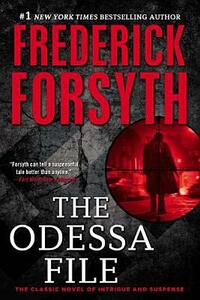Take a photo of a barcode or cover
"The Odessa File" is probably the best espionage thriller that I have read, certainly the best that did not take place in wartime. It's the story of Peter Miller, a German journalist who comes across secrets from World War II that he gleaned from the diary of a Jewish holocaust survivor who had just died. Miller is a journalist of a bygone era. Unlike American journalists of today, Miller saw himself as a dogged crusader for the truth, and not a cog in the propaganda aparatus of the current administration. Anyway, in the course of his research he uncovers the "ODESSA", an organization of former SS officers who have scattered across the globe after the war.
Miller wants to infiltrate this organization and blow it open. With the help of the Israeli Mossad, he assumed the identity of an SS NCO and, after a tough grilling, was allowed into the ODESSA organization. But ODESSA got wise to him, and eventually he became the prey rather than the hunter.
This is a great page turner and very interesting. The fact that the novel deals with a "real", or at least suspected to be real, organization of ex-SS Nazis and a real life SS officer named Roschmann who was unearthed in South America in the 1970s after this novel became a movie, makes it even more exciting. My only problem with this novel is that it commits the cardinal sin of mystery and suspense novels, it relies too much on chance and coincidence. Miller discovers the diary after coincidentally pulling his car over in the street and figuring out about the Jewish man. There are several twists in the story that come about purely through chance. This takes away from the story. It makes things sound like a lucky guy stumbled into a good thing, rather than a skilled operative who succeeds through a brilliant effort. Granted that Miller is not a professional spy so I suppose liberties need to be accepted. Still, this detracted from the novel in my mind.
I would recommend "The Odessa File" to anyone who likes a good espionage thriller.
Miller wants to infiltrate this organization and blow it open. With the help of the Israeli Mossad, he assumed the identity of an SS NCO and, after a tough grilling, was allowed into the ODESSA organization. But ODESSA got wise to him, and eventually he became the prey rather than the hunter.
This is a great page turner and very interesting. The fact that the novel deals with a "real", or at least suspected to be real, organization of ex-SS Nazis and a real life SS officer named Roschmann who was unearthed in South America in the 1970s after this novel became a movie, makes it even more exciting. My only problem with this novel is that it commits the cardinal sin of mystery and suspense novels, it relies too much on chance and coincidence. Miller discovers the diary after coincidentally pulling his car over in the street and figuring out about the Jewish man. There are several twists in the story that come about purely through chance. This takes away from the story. It makes things sound like a lucky guy stumbled into a good thing, rather than a skilled operative who succeeds through a brilliant effort. Granted that Miller is not a professional spy so I suppose liberties need to be accepted. Still, this detracted from the novel in my mind.
I would recommend "The Odessa File" to anyone who likes a good espionage thriller.
Entertaining book. I guessed the "twist" well ahead of time but plot keeps a rapid pace throughout so its easy to get stuck in and just binge read. Really enjoyable and suspenseful.
Absolutely incredible! What a thriller. The most disturbing part is that most of the characters are based on real people, and much of the events are based on historical fact. I've senn many a documentary on the Nazi's, but this book helped me understand just how cold and cruel there really were
adventurous
tense
fast-paced
Peter Miller is a young, energetic, freelance reporter. On his way home he hears news of the Kennedy assassination on the radio, and then happens upon the suicide of a holocaust survivor. A police friend hands over the dead man’s diary, and Miller reads of the suffering he endured in a concentration camp. In the early 60’s, many in Germany want to put the horrors of the war in the past, but the Odessa are intent of supporting ex-SS men, and bringing back the ‘glory’ of the organisation. Something in the diary catches Miller’s interest, and he sets out to track down the notorious concentration camp commander mentioned in the diary.
As ever, Forsyth paints an engaging picture. Miller is sympathetic, if rather self-centred – I could not get the image of John Voight out of my head from the film, but the film is not a faithful adaptation, so not a problem. The story proceeds at a decent pace – the extracts from the diary are a tough read, Miller’s attempts to track the man down are well written, and the Odessa men are real, if horrific, rather than pantomime villains. A cracking read, even if I knew the ending.
As ever, Forsyth paints an engaging picture. Miller is sympathetic, if rather self-centred – I could not get the image of John Voight out of my head from the film, but the film is not a faithful adaptation, so not a problem. The story proceeds at a decent pace – the extracts from the diary are a tough read, Miller’s attempts to track the man down are well written, and the Odessa men are real, if horrific, rather than pantomime villains. A cracking read, even if I knew the ending.
dark
informative
inspiring
tense
medium-paced
Plot or Character Driven:
Plot
Strong character development:
Yes
Loveable characters:
Yes
Diverse cast of characters:
Complicated
Flaws of characters a main focus:
Yes
dark
mysterious
reflective
tense
medium-paced
Plot or Character Driven:
Plot
Strong character development:
No
Loveable characters:
Complicated
Diverse cast of characters:
No
Flaws of characters a main focus:
Yes
dark
mysterious
medium-paced
Two main reasons exist to read The Odessa File. First, despite its story of former Nazis working to launch Egyptian missiles at Israel, it's a Cold War thriller. And its publication in 1972 came at a time not only of a climax in Arab-Israeli affairs (the Yom Kippur War would occur just a year later, in 1973) but also at a time when the United States and Soviet Union were positioning themselves for their final showdown in the Middle East. This confrontation would be resolved in favor of the US, with the Egyptian-Israeli peace accord following the expulsion of the Soviets from Egypt in 1972, just as it would be in Europe with the final collapse of the Soviets and Eastern Bloc in 1989. This is the context in which to understand Forsyth's novel. The Odessa File may have been set in the winter of 1963-64, but it reflected the newly building political realities of the early 1970s.
The second reason to look at the book is as a work of Holocaust literature. And this is where Forsyth gets himself in trouble with some critics. As Richard Brickner wrote in his 1972 New York Times review: '“The Odessa File” leaves one feeling that Forsyth has borrowed painful, live history in order to spring a few quick thrills.' And so it is argued: Forsyth, while writing a sympathetic (some would say "blindly sympathetic") work towards Israel, nevertheless used the Holocaust as a mere theme for a pulp fiction thriller--and the making of a lot of money. This charge has carried down through the decades, despite the involvement of Simon Wiesenthal in Forsyth's effort. That is the literary context and the most serious argument in criticizing the book.
So, the novel has an important political and literary pedigree. What of the merits of the novel itself? That is where The Odessa File is such a let down. The dialog is leaden; it's often painful to read through. So are the endless and unnecessary sidebars on history. As for the characters? As Brickner, above, wrote, they're duds. All seem faceless and not worth our attention. But one, that is. The fictional diary of Salomon Tauber is the best part of the book. He is the only fully fleshed out character among the bunch. About him, you care; you just wish there was more to be told.
The second reason to look at the book is as a work of Holocaust literature. And this is where Forsyth gets himself in trouble with some critics. As Richard Brickner wrote in his 1972 New York Times review: '“The Odessa File” leaves one feeling that Forsyth has borrowed painful, live history in order to spring a few quick thrills.' And so it is argued: Forsyth, while writing a sympathetic (some would say "blindly sympathetic") work towards Israel, nevertheless used the Holocaust as a mere theme for a pulp fiction thriller--and the making of a lot of money. This charge has carried down through the decades, despite the involvement of Simon Wiesenthal in Forsyth's effort. That is the literary context and the most serious argument in criticizing the book.
So, the novel has an important political and literary pedigree. What of the merits of the novel itself? That is where The Odessa File is such a let down. The dialog is leaden; it's often painful to read through. So are the endless and unnecessary sidebars on history. As for the characters? As Brickner, above, wrote, they're duds. All seem faceless and not worth our attention. But one, that is. The fictional diary of Salomon Tauber is the best part of the book. He is the only fully fleshed out character among the bunch. About him, you care; you just wish there was more to be told.
The author has an amazing style of storytelling. The story takes time to pick up. There has been various moments where the chase was thrilling. I am disappointed with the climax. I guess this was deliberate as the author wanted to connect the story to real life and everything can't be given a proper ending.




